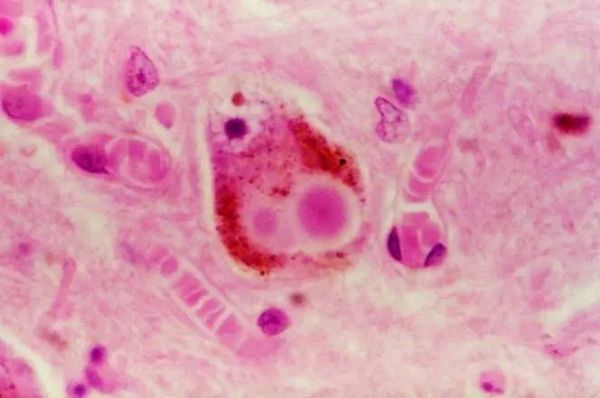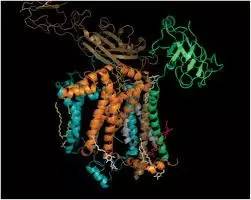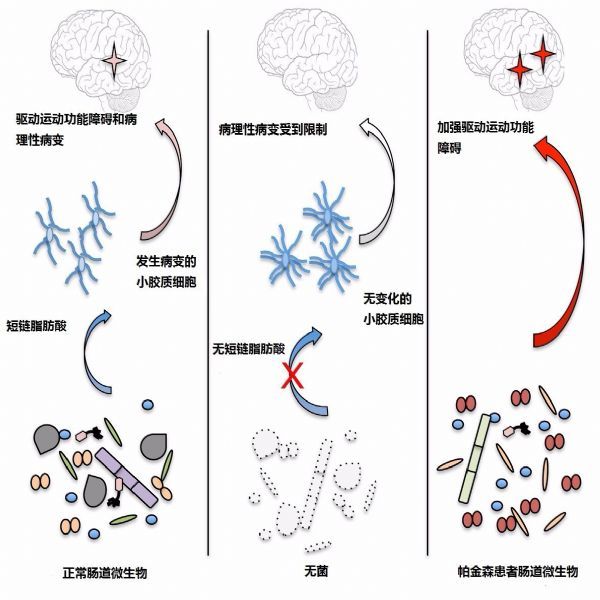Release date: 2017-12-27
200 years ago, a British surgeon, James Parkinson, published a paper on "tremor palsy". Sixty years later, in order to commemorate him, the disease was named "Parkinson's disease." Scientists have always focused on the "brain" when studying treatment methods. In addition to inventing drugs that activate neurons in the brain, bold scientists use electric fields to directly stimulate the brain. Professor Heiko Braak from the University of Frankfurt, Germany, suddenly gave the researchers “a great drink†when everyone felt that “the direction was incomparably correct, but it took timeâ€: the source of Parkinson's disease is not necessarily in the brain, it Also in the intestines [1]!

Brain micrograph of patients with Parkinson's disease
In 2003, this point was put forward, which means that in the past 200 years, many scientists have been "running off" in the research direction. This was a "land of thunder" in the academic circles of that year. Not surprisingly, this view was attacked at the time. Most importantly, Professor Braak gave the basis that the patient's digestive system had problems in the early stages of the disease, and he had no other more powerful evidence to support his views.
On December 1st, Professor Sarkis Mazmanian of the California Institute of Technology published an article in the international top journal Cell magazine [2]. As the author of the article, he said, “We first discovered the link between intestinal microbes and Parkinson's disease from the biological mechanism. In layman's terms, studies have shown that the origin of this disease may be not only in the brain, but also in the intestine. There is also a part. At the same time, this discovery will be a signalistic change for Parkinson's treatment, which brings new directions and possibilities."

Professor Sarkis Mazmanian
The cause of Parkinson's disease is the accumulation of α-synuclein (αSyn) in the brain, the death of dopamine neurons, and the reduction of dopamine (DA) secretion, a key neurotransmitter that regulates motor and mood functions. Therefore, Parkinson's patients will have muscle stiffness, "shake like sputum" and other symptoms. In treatment, doctors tend to focus on increasing the level of dopamine in the brain, but the effect of treatment is limited. The longer the time, the more obvious the side effects of the drug and the weaker the effect.

αSyn structure simulation diagram
In view of the fact that studies have found that the intestinal microflora of patients with Parkinson's disease will change [3], and in fact, 50% of the body's dopamine is produced by the intestine, so researchers are gradually looking at the brain. "Turn to the "intestines." In this new study, Professor Mazmanian's team used three experiments to show us the link between gut microbiota and Parkinson's disease.
First, the researchers prepared two groups of mice overexpressing αSyn protein, one group with normal intestinal flora and one group sterilized. After a period of training, the two groups of mice had some different performances. Protein accumulation began in the brains of mice with normal intestinal microbes, and brain imaging also showed brain damage. The researchers also gave them some tests for Parkinson's disease, for example, passing between two columns. Use your claws to get rid of the sticky glue on your nose, climbing rods, etc., but the completion of these mice is not ideal, they can not accurately control their movements, but also frequently collide and wrestle.

In contrast, sterile mice are much better, although alphaSyn proteins remain "high-yielding", but surprisingly, there is no protein accumulation in their brains, and there is no pressure in the test. The ground has completed the prescribed action.
Next, the researchers fed the same short-chain fatty acids to both groups of mice, which are metabolites of intestinal microbes. They hope that by simulating the normal metabolism of gut microbes, it will be observed whether sterile mice will have symptoms similar to Parkinson's disease. As expected, after a period of feeding, the sterile mice showed the same symptoms as the normal mice in the intestinal flora, indicating that some of the chemicals produced by the intestinal microbes played a "deteriorating effect". .
In the third experiment, in order to avoid the problem of “inappropriate intestinal flora†in laboratory mice, the researchers better simulated the effects of human intestinal flora, and the stools of healthy people and Parkinson's disease patients were respectively Sterile mice overexpressing αSyn were transplanted, and the symptoms of mice that obtained intestinal microbes from Parkinson's disease patients were significantly more severe than those transplanted with healthy human flora. For this result, Professor Mazmanian believes that it is convincing enough to mean that there are certain kinds of bacteria in the intestinal flora of Parkinson's patients, which are the main culprit in the "hand in hand" with αSyn.

At the same time, the author of the article, Timothy Sampson, reminded them to treat the diseased mice with high concentrations of antibiotics in the experiment. Although the condition of the mice has been alleviated, long-term, high-intensity antibiotic treatment is clearly unwise, leading to other immune and metabolic disorders, so antibiotic therapy cannot be used as a conventional treatment for Parkinson's disease.
In the experiment, the researchers observed that in the two groups of mice transplanted with healthy humans and Parkinson's gut microbiota, there were more than a dozen genus of intestinal microbes, and the same diseased mice, between them microbes The difference is not exactly the same. But to accurately identify them, analyze which microbes really play a role, which microbes are only "accidentally changed", and rely on a lot of subsequent work, which is the next research content of the researchers. one. They hope that these microorganisms or their metabolites can become a "target" in future treatment, and achieve "precise treatment" of Parkinson's disease.
For this goal, Professor Mazmanian has been working hard. To this end, he also founded Axial Biotherapeutics, which just completed a $19.15 million financing on Tuesday to develop new therapies for the treatment of neurological diseases using intestinal microbes [4] . Whether it is the company's development or this research, Professor Mazmanian is full of confidence. "The invention of any drug, from mice to humans, has to go through a long, complicated experiment, but we have taken a long-term perspective. In the first step of the goal, we discovered the intestinal-brain connection of neurodegenerative diseases, and we will continue to work hard to find new, safe and effective drugs."
Source: Singularity
Autoclave Sterilizer Products,Washer Disinfector,Autoclave Sterilizer,Atomizing Disinfection Robot
Guangdong Widinlsa International Co.Ltd , https://www.guangdongwidinlsa.com